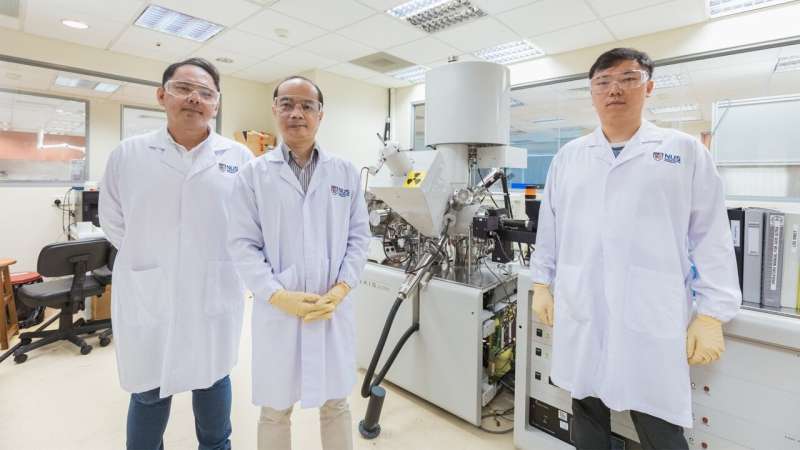National University of Singapore (NUS) researchers have developed an electron transfer mechanism that involves a switchable metal and oxygen redox chemistry in nickel-oxyhydroxide-based materials, with light as the trigger. Due to an accidental power outage, the researchers discovered that the material's performance fell sharply in the dark, despite literature stating that it is not sensitive to light. They repeated the experiments and came up with the idea of transparent water cells containing the water to introduce light into the water-splitting process. In contrast to the traditional adsorbate evolution mechanism (AEM) and lattice oxygen oxidation mechanism (LOM), “the proposed light-triggered coupled oxygen evolution mechanism requires the unit cell to undergo reversible geometric conversion between octahedron (NiO6) and square planar (NiO4) to achieve electronic states (around the Fermi level) with alternative metal and oxygen characters throughout the oxygen evolution process,” the team said in “Pivotal role of reversible NiO6 geometric conversion in oxygen evolution,” which was recently published in Nature. This electron transfer pathway can bypass the oxygen-oxygen bonding in AEM and the deprotonation in LOM.
Oman‘s Ministry of Energy and Minerals has unveiled a new national green hydrogen strategy, with a production target of 1 million tons by 2030. It will set targets, a measurement mechanism, and a follow-up methodology for the initiatives and projects in collaboration with local and international companies. The plan includes the creation of a center that will undertake the supervising and followup plans and programs of carbon neutrality, likely in special economic zones, and a new state-owned hydrogen company called Hydrom, which will open a public bidding round on Nov. 6. The company aims to award the first land blocks by 2023, in order to meet the 2030 production target.
Nikola Corp. and KeyState have teamed up to create a low-carbon hydrogen production value chain, including fully integrated commercial carbon capture and storage, in Pennsylvania. KeyState, a hydrogen and chemicals production facility, will supply Nikola with up to 100 metric tons per day of low-carbon hydrogen. The site will be operational in 2026 and will integrate carbon capture from autothermal reforming with onsite geological carbon sequestration. The two sides are also working to develop a liquefaction solution to support the distribution of hydrogen from the project to Nikola's planned refueling network under development.
The UK government has sent an open letter to Gas Distribution Networks inviting it to propose plans for a pilot hydrogen town. The companies will then complete a plan so the government can make strategic decisions about the role of hydrogen in heating by 2026. They said they could launch a hydrogen-heated town pilot by 2030.
Popular content
Hexagon Purus has signed a four-year supply agreement with CaetanoBus as its preferred supplier of hydrogen fuel systems for serially produced, fuel-cell transit buses. Hexagon Purus will supply the hydrogen fuel systems from its facility in Kassel, Germany. The estimated potential value over the lifetime of the agreement is €35 million ($34.6 million).
Flowserve and Chart Industries have signed an agreement to support the growth of hydrogen. “Flowserve will acquire in-process R&D related to Chart's liquid hydrogen fueling pump and will be Chart's sole manufacturer and supplier of the pump once commercial production has begun,” said the Texas-based flow control products and services specialist.
Annalena Baerbock, the German minister of foreign affairs, has visited Kazakhstan to strengthen hydrogen collaboration between the two countries. “Baerbock announced plans to open a German Hydrogen Diplomacy Office in Astana,” said the government of Kazakhstan.
This content is protected by copyright and may not be reused. If you want to cooperate with us and would like to reuse some of our content, please contact: editors@pv-magazine.com.


4 comments
By submitting this form you agree to pv magazine using your data for the purposes of publishing your comment.
Your personal data will only be disclosed or otherwise transmitted to third parties for the purposes of spam filtering or if this is necessary for technical maintenance of the website. Any other transfer to third parties will not take place unless this is justified on the basis of applicable data protection regulations or if pv magazine is legally obliged to do so.
You may revoke this consent at any time with effect for the future, in which case your personal data will be deleted immediately. Otherwise, your data will be deleted if pv magazine has processed your request or the purpose of data storage is fulfilled.
Further information on data privacy can be found in our Data Protection Policy.